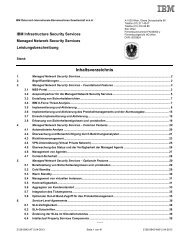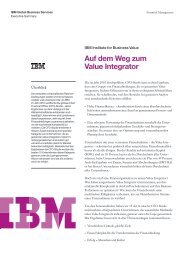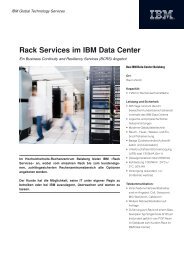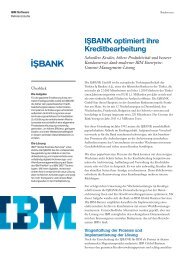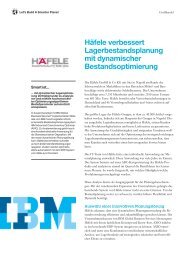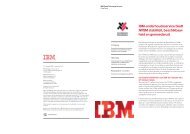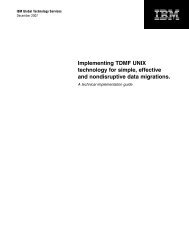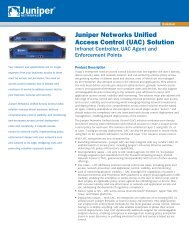A Primer for Healthcare Managers - IBM
A Primer for Healthcare Managers - IBM
A Primer for Healthcare Managers - IBM
Create successful ePaper yourself
Turn your PDF publications into a flip-book with our unique Google optimized e-Paper software.
IT Outsourcing: Web Hosting as a Case Study<br />
By Ranapratap Chegu, Principal Consultant, <strong>IBM</strong> Business Consulting Services<br />
One type of IT outsourcing that has become popular in<br />
recent years has been web hosting. The following are types<br />
of web hosting that have emerged.<br />
1. Virtual or Shared Hosting<br />
In this model, the Internet Service Provider (ISP) provides<br />
the hardware, network, and, in some cases, database<br />
software <strong>for</strong> their clients on a lease basis. The managed<br />
services such as network management/monitoring, backup/<br />
recovery, operating system, server hardware, firewalls,<br />
and database administration are provided fully by the ISP<br />
staff. The clients are given limited access to the servers to<br />
maintain the application code and the website metrics data.<br />
Advantages:<br />
• Typically this solution is popular because it is cost effective.<br />
• Customers do not need to integrate the infrastructure as well<br />
as maintain it.<br />
• Leasing the infrastructure is always easier than procuring it.<br />
• For the public sector, this is an effective solution <strong>for</strong> the<br />
unclassified type projects with limited budgets.<br />
Disadvantages:<br />
• Per<strong>for</strong>mance is a major issue as the servers and the network<br />
are shared among many clients.<br />
• Security is also another big concern as the firewalls and<br />
web/application servers are shared.<br />
• Configuration management becomes complicated.<br />
• May not pass government security audits if the servers that<br />
host government applications are shared with non-governmental<br />
clients.<br />
• Not a suitable solution <strong>for</strong> mission-critical applications as the<br />
system uptime is dependent on many shared activities.<br />
• Risk of exposure if the ISP goes out of business.<br />
2. Dedicated Hosting<br />
In this model, the ISP provides the dedicated infrastructure—i.e.,<br />
firewalls, servers, backup—on a lease basis. The<br />
managed services such as network management/ monitoring,<br />
backup/recovery, operating system, server hardware,<br />
firewalls, and database administration are<br />
provided by the ISP staff. Clients are given limited access<br />
to the servers to maintain the application code and the<br />
website metrics data.<br />
Advantages:<br />
• Superior system per<strong>for</strong>mance as the infrastructure<br />
is dedicated.<br />
• Better configuration management and security.<br />
• Customers do not need to integrate the infrastructure as well<br />
as maintain it.<br />
• Leasing the infrastructure is always easier than procuring it.<br />
• For the public sector, this is an effective solution <strong>for</strong> the<br />
unclassified as well as sensitive but unclassified type projects.<br />
• With per<strong>for</strong>mance-based contracts, government can closely<br />
monitor the quality of the services provided by the ISP.<br />
• Guaranteed uptime is achievable.<br />
Disadvantages:<br />
• This solution is expensive as the infrastructure is<br />
dedicated.<br />
• Risk of exposure if the ISP goes out of business.<br />
3. Co-Location Hosting<br />
In this model, the ISP provides only physical space, bandwidth,<br />
power, and limited managed services. Clients bring<br />
their own server hardware, operating system, software,<br />
and database. Clients’ staffs install and maintain their<br />
systems by themselves. In some cases the clients may use<br />
the shared backup and network monitoring/ management<br />
services of the ISP to make the solution<br />
more cost effective.<br />
Advantages:<br />
• Superior system per<strong>for</strong>mance as the infrastructure<br />
is dedicated.<br />
• Better configuration management and security.<br />
• For the public sector, this is an effective solution <strong>for</strong> the<br />
unclassified as well as sensitive but unclassified type projects.<br />
• With per<strong>for</strong>mance-based contracts, government can closely<br />
monitor the quality of the services provided by the ISP.<br />
• Guaranteed uptime is achievable.<br />
• Easily can pass government audits.<br />
• The system can be transferred to another location<br />
easily if the ISP goes out of business.<br />
Disadvantages:<br />
• This solution is expensive as the infrastructure is<br />
dedicated.<br />
• Long procurement cycles can delay the project<br />
deadlines.<br />
• This solution is <strong>for</strong> clients who have bigger budgets<br />
as well as their own staff to maintain their systems.<br />
<strong>IBM</strong> Center <strong>for</strong> <strong>Healthcare</strong> Management 7




